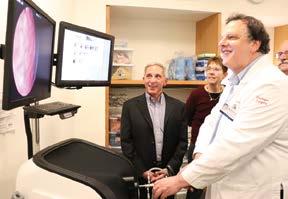
3 minute read
Safe & Sound Urologic Surgical Training
Official ribbon cutting for the new TURP surgical simulator. From left to right: Drs. Kate Berg, Costas Lallas, with Joyce Rivas and Drs. Dale Berg, David Rivas, Leonard Gomella and Pat Shenot. Drs. Kate and Dale Berg are Co-Directors of Jefferson’s Rector Clinical Skills and Simulation Center. Dr. Pat Shenot demonstrating his TURP (transurethral resection of the prostate) skills on the new simulator while David and Joyce Rivas look on.

Rivas family gift provides Jefferson Urology with a state-of-the-art surgical simulator.
In the “olden days” of medicine—just a few years ago—surgeons learned their craft based on a “see one; do one; teach one” approach to education. The saying articulates the traditional method of teaching surgery: Trainees observe a procedure and are then expected to be able to perform it, after which they teach the operation to the inexperienced. It was an effective way of training physicians, but it came with risks to patients, especially as young surgeons progressed from the “see” stage of training to the “do” stage.
Surgical simulation with high-end computers and L 3D Kidney Models Facilitate Robotic Surgery CD displays marks a new era in physician training and patient safety. Thanks to a generous gift from David and Joyce Rivas, Jefferson’s Department of Urology can now teach the hands-on craft of transurethral surgery without laying a hand on a patient.
The TURP Mentor Surgical Simulation System allows Jefferson residents to experience and become proficient at an array of endoscopic surgeries, such as prostate and bladder tumor resections, before setting foot in the operating room. The new urology-specific technology, unveiled at a February 2020 ribbon cutting in Jefferson’s Surgical Simulation Center, enables the department to teach future surgeons how to “do” a procedure without exposing patients to previously minimized but unavoidable risks at the hands of inexperienced learners. The TURP simulator joins other high-tech teaching tools including laparoscopic and robotic surgery training simulators.
These advanced, 3D systems provide trainees with realistic, hands-on experiences that involve mastering instruments and managing complications without performing procedures on live patients. The system records simulated surgeries and provides real-time feedback and objective reports. Experts predict that surgical simulation training will soon be required as part of medical board exams. Introducing Jefferson Urology residents to this cutting-edge technology will better prepare them for the future while moving our program even further ahead of peer programs.
“Surgical simulation is the dawn of a new era in physician training,” notes Dr. Leonard Gomella, Urology Chair and Bernard W. Godwin Professor of Prostate Cancer. “The TURP Mentor Simulator, a first-of-its-kind technology, will be so impactful to the training our department provides residents to become skilled surgeons.”
Dr. David Rivas is an alumnus of Sidney Kimmel Medical College (Jefferson Medical College) Class of 1984, completed his residency in Urology (1987-91) and fellowship in NeuroUrology and Incontinence (1992-94) at Thomas Jefferson University Hospital. He served as Assistant Professor of Urology at Jefferson since 1994 and Director of the Division of Neuro-Urology (1996-2000). Currently, he leads pharmaceutical research and development efforts in the Infectious Diseases and Vaccines Therapeutic Area at Janssen, the Pharmaceutical Companies of Johnson & Johnson, as Senior Director, Compound Development Team Leader. Joyce Rivas is Advisory Chairperson at Doylestown Hospital’s Animal Assisted Therapy Program where she also volunteers with her therapy dog.
After touring the Rector Clinical Skills and Simulation Center at Jefferson, one of 85 accredited centers in the country, Dr. Rivas discussed with Drs. Gomella, Lallas, and Brownstein his interest in supporting a simulation device. In the spring of 2019, David and Joyce made a gift to purchase the TURP Mentor Surgical Simulation System that was installed in 2020.
“Visionary donors like David and Joyce Rivas know how important it is to train new generations of urologic surgeons,” observes Dr. Gomella. “Their generosity makes it possible for Jefferson to do just that while upholding, more securely than ever, our stringent standards for patient safety and high-quality health care.”








